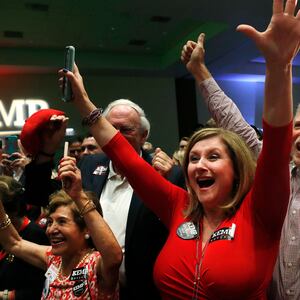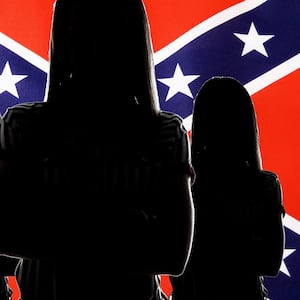In recent weeks, as election day nears and nervous prognostications about the outcome proliferate, I’ve noticed a new kind of article emerge. These pieces, part confessional essay and part apology letter-by-proxy, brim with quotes from white women who helped Donald Trump win the presidency in 2016 but who now plan to vote for Joe Biden.
In regretful tones, these women describe feeling “riddled with guilt,” “embarrassed,” and “sick to [their] stomach” for voting into office a “moron” and “bully” who “represents everything that I don't want my children to grow up to be." “I really failed my fellow American citizens,” one white woman told the Guardian. “I’m extremely disappointed in myself...If I were to vote again for Donald Trump in 2020, it would be just as much a failure as an American, but also a failure as a human being.”
They were “duped” into voting for Trump, or just accidentally “got it wrong,” these white women imply, or outright state—an alibi that’s impossible to square with the unchanging nature of this president, who made his racism, xenophobia, and predatory tendency to grab women “by the pussy” well known long before Nov. 8, 2016. Their protestations conjure what writer Ruby Hamad has labeled the “illusion of innocence” that white women reliably use, a mirage that “deflects and denies the racial crimes of white society.” These women knew that Trump would inflict widespread harm—that he would ban Muslims, end DACA, stuff the courts—because that is precisely what he promised to do. What they could not foresee was COVID-19, or how they might get swept up amidst the collateral damage of so much Trumpian failure.
ADVERTISEMENT
When a white school teacher, afraid to return to class because she is immunocompromised, states she did not recognize her vote for Trump “was [potentially] signing my own death warrant,” it reads as an unwitting admission of how the same self-interest that drove her indifference to the danger Trump posed now fuels her concern with it. These protestations of innocence ring particularly hollow to Black women, who in pre-election poll after poll expressed more fear about a Trump presidency than any other group.
The apologies and confessionals are paired with an endless series of articles asking us to believe that these kinds of white women will abandon Trump this election cycle—that they will save us from the very same monster they helped curse us with—a prediction that seems based in ahistorical blind faith. The talk about how 2020 could see “the largest gender gap in any presidential election in US history,” fueled by white women who “appear to be moving away from Trump” could have come straight from 2016. “The Trump-Clinton Gender Gap Could Be The Largest In More Than 60 Years,” one headline blared then, citing a “potential decrease with white women in particular” predicted to vote for Trump. “Working-class white women now appear to be jumping off the Trump train” a piece published less than a month before the election declared, while another from the same week assured that “Trump is struggling to get the support of white women.”
We all know how that worked out. A plurality of white women voters overall, 47 percent, chose Trump, and working-class women voted for Trump over Hillary Clinton by a margin of 27 points. Even among white college-educated women, Clinton’s supposed “firewall” against Trump according to multiple outlets, just 51 percent went with her. If the only women who voted in 2016 had been white women, Trump would have won an additional 51 electoral votes.
For more reasons not to count on white women, just have a look at how they’ve continued to vote for Trumpian Republican candidates since then. In 2017, 51 percent of white women who voted in Virginia’s gubernatorial race chose Ed Gillespie, the pro-Confederate statues, anti-changing-the-racist-“Redskins”-football-team-name candidate. That same year, 55 percent of white women voted for New Jersey gubernatorial candidate Kim Guadagno, whose campaign commercials suggested Hispanic immigrants are mostly “deranged murderers.” Most white women chose Senator Ted Cruz over Beto O’Rourke in Texas during the 2018 midterms.
Georgia’s Brian Kemp, who said he would use his own pickup truck “to round up criminal illegals,” won white women’s votes over Stacey Abrams, ending her campaign to become the first Black woman governor in American history. A whopping 76 percent of those white women chose Kemp, meaning they went even harder for the racist in that contest than white men did. Solidarity, as the old (in internet time) saying goes, is for white women.
Over-reliance on polls is always dangerous, but a September survey found three out of five non-college-educated white women are still backing Trump, and a more recent Pew poll found working-class white women are supporting Biden at the same losing rate they did Clinton. The best, or at least most hopeful, polling shows Biden evenly splitting their votes with Trump, 49 percent to 49 percent. In the presidential election years between 1952 and 2016, white women have preferred the Democrat just twice: Lyndon B. Johnson in 1964 and Bill Clinton in 1996. The grounds on which to trust them this time around is Richter-scale shaky.
So, too, is the premature effort to recast white women, who contributed so heavily to Trump’s win, as leaders of the resistance. As a group, they have what should be regarded as a rock-solid history of choosing to side with the structural power granted by whiteness over any identity that would serve in favor of racial equity. This is who they have always been. White mistresses, per Duke University historian Thavolia Glymph, also “beat and humiliated” enslaved Black folks. It was white ladies who erected the majority of Confederate monuments honoring white men who fought for slavery, and explicitly wrote textbooks praising the Ku Klux Klan.
The white suffragettes sold out Black women, with Susan B. Anthony famously declaring, “I will cut off this right arm of mine before I will ever work or demand the ballot for the Negro and not the woman.” The white women who fought against integration during the Civil Rights movement—the mothers of massive resistance—were the “constant gardeners of segregation," to use a phrase coined by historian Elizabeth Gillespie McRae. And it was also white women who corrupted and co-opted feminism, transforming a freedom movement into a “route to class mobility”—“colluding with the subordination of working-class and poor women,” especially women of color, and leaning into white male patriarchy to get theirs under the terms of white supremacy, even if everyone else suffers.
Why would we expect more in the year in which white women, having always employed the illusion of innocence to enact both extrajudicial and state-backed violence against Black folks, were finally organized under the taxonomic designation of “Karens”? When Amy Cooper, feigning an attack by a bird-watching “African American man”—to use the words she so carefully enunciated on not one, but two, bogus 911 calls—was captured in the act doing what so many white women have done before. When Satchuel Cole and Jessica Krug proved white women’s belief that Blackness is always theirs to exploit and consume, for cultural cachet or tenure dollars.
Former Reagan speechwriter and white lady extraordinaire Peggy Noonan—who has said nary a word about homophobe Trump dancing to the gayest of anthems—recently attempted an incredibly patronizing dressing down of the first Black and South Asian female vice presidential candidate on a major party ticket not for her words on the stump, but for “dancing with drum lines,” which Noonan labeled “embarrassing.” Perhaps the only things that rise to that level of white ladyness we’ve seen in recent months is Marsha Blackburn crying crocodile tears over nonexistent “cancel culture,” then essentially pulling a “let me speak to the manager” because a Google employee dared criticized her. Or Susan Collins—despite the fact that 50 percent of Black folks in her state “live in poverty, compared with 27.6 percent nationally," or that Maine "has had the worst racial disparity in [coronavirus] cases in the country”—stating she does “not believe systemic racism is a problem in the state of Maine.” Or Amy Coney Barrett, promising to take her cues as a Supreme Court jurist from a Constitution that recognized neither Black folks nor women as fully human people.
Look, some of my very best friends are white women. (It’s true, but also, see how annoying that is?) But in all matters, as a body, white women have consistently enabled patriarchy and been the rearguard of anti-Black racial violence. Trump has been plenty mocked for his recent groveling, naked appeals to the racism of suburban women—the white ones, anyway—but I’m sure he figures, why muck with a historically winning formula?
I will be absolutely surprised if on Election Day, white women choose decency over white supremacy. Until then, the one thing Trump and I have in common is our shared belief that they won’t.







